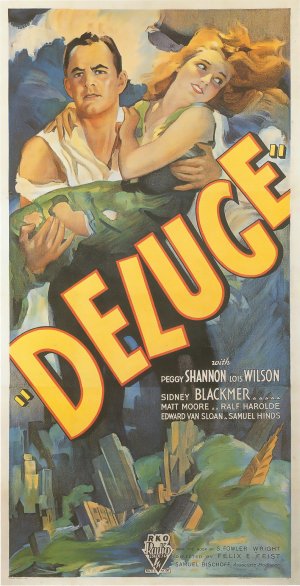 This proto-disaster movie hails from 1933. No, it’s not “good” by any means, but is fascinating in its presentation of one of Hollywood’s favorite movie tropes in embryonic form.
This proto-disaster movie hails from 1933. No, it’s not “good” by any means, but is fascinating in its presentation of one of Hollywood’s favorite movie tropes in embryonic form.
Loosely adapted from a 1928 novel by S. Fowler Wright, THE DELUGE is often referred to, erroneously, as the “first” disaster movie of the sound era. In fact, that honor goes to Abel Gance’s LA FIN DU MONDE, which premiered in 1931, and appears to have been an influence on THE DELUGE. What it offers are elaborate special effects that were beyond Gance’s reach, and which foreshadow the mayhem of subsequent disaster movies like EARTHQUAKE, THE DAY AFTER TOMORROW, SAN ANDREAS, etc.
Considered lost for many years, THE DELUGE currently exists in an Italian dubbed print that runs a little over an hour, and may or may not be missing footage from its original English language version.
A superstorm is coming. Barometers are steadily falling and catastrophic disasters have ripped through Europe. In the US ships are called in to port and planes grounded as people and newspapers warn that the end of the world is at hand.
The mayhem begins with the west coast of the United States destroyed by earthquakes. This causes the east coast to be deluged by tsunamis, which nearly wipe out civilization.
Amid all this madness we meet the east coast dweller Norwood, who takes refuge in a shack that somehow survives the deluge. The shack is manned by Jepson, a brute, and the already tense atmosphere is heightened by the arrival of a young woman named Claire. The two men are nearly driven mad with lust, and Claire, a champion swimmer in her former life, swims off.
Her exhausted body is discovered on a beach by Martin, a family man who’s been separated from his wife Helen and two young children. He’s living in a shack of his own, located near a cave where he spends much of his time.
Jepson goes in search of Claire…and finds her in Martin’s arms. He clubs Martin and makes off with Claire, but Martin tracks him down and steals Claire back.
Helen and her two kids, meanwhile, have settled amid a ragtag band of survivors led by a guy named Tom. Helen is convinced her husband Martin is still alive, but Tom demands she get married to one of the men on hand.
The peeved Jepson forms a makeshift gang to track down Claire. They head to Martin’s cave, where he and Claire are hiding, and attempt to engage them via smoke and gunfire. The siege is ended after Claire beats Jepson to death and Tom and his fellows intercede. But Martin still has to contend with the fact that his wife and children are alive, which obviously complicates his relationship with Claire…
Cinematically this film is competent but undistinguished. It’s packed with Biblical references, thus aligning it with other films of the time (such as the notorious Cecil B. DeMille “religious” dramas MADAM SATAN and SIGN OF THE CROSS) that used religious overtones to justify their exploitive content.
In a reversal of standard disaster movie structure, the spectacle of THE DELUGE occurs in the first 20 minutes, after which the “human drama” takes hold. That drama is reasonably compelling, being fast moving and involving (implied) sex, savagery and the sight of an attractive woman in a skimpy bikini, all things that surely riled 1930s-era censors. It’s no surprise that the Hollywood production code, established in 1930, became strictly enforced in 1934, a year after the release of THE DELUGE.
The film’s true selling points, of course, are the special effects. Scenes of model buildings crumbling apart and engulfed by waves were quite innovative for the time, and are more memorable than anything else in this film. This means there’s no shame in watching the first twenty minutes of THE DELUGE and fast-forwarding through the rest.
Vital Statistics
THE DELUGE
RKO Radio Pictures
Director: Felix E. Feist
Producers: Samuel Bischoff, Burt Kelly, William Saal
Screenplay: Warren Duff, John F. Goodrich
(Based on a novel by S. Fowler Wright)
Cinematography: Norbert Brodine
Editing: Martin G. Cohn, Rose Loewinger
Cast: Peggy Shannon, Lois Wilson, Sidney Blackmer, Fred Cohler, Lane Chandler, Matt Moore, Ralf Harolde, Ronnie Cosby
